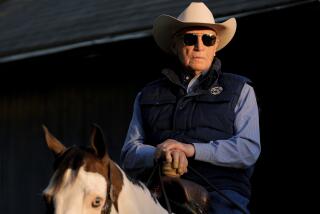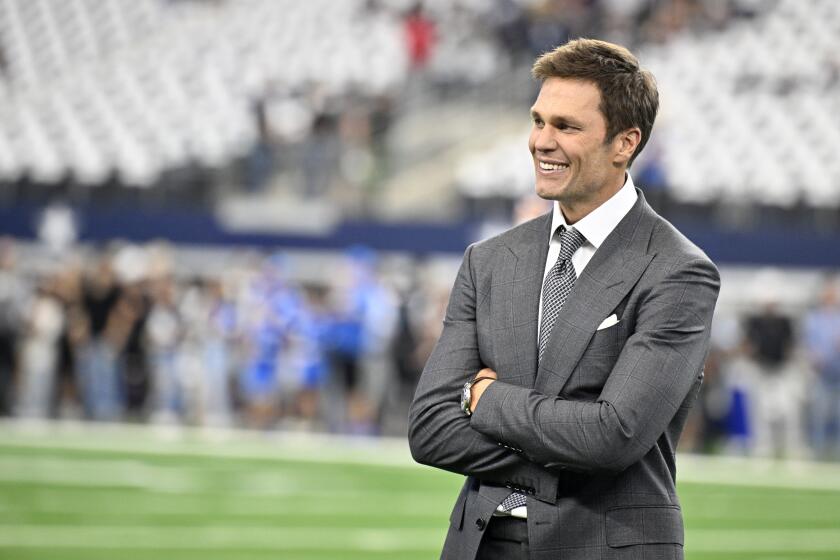Veteran Reporter on Hoof Beat Has Been in Form for 50 Years
In late July, on opening day at Saratoga, they got around to naming the press box after Joe Hirsch. That great idea was several years overdue, but then you have to understand that only the horses move quickly at Saratoga. The track was about 100 years old before the press box got a ladies’ room.
As for Hirsch, when the applause died down, he went back to doing what he’s always done best, cranking out a column for the Daily Racing Form.
His days were always long--up early to watch the workouts and interview the trainers, working the phones afterward for national items, then hanging around to report on the races in the afternoon.
Except on special occasions--his books, his no-stone-unturned annual reviews for the now-defunct American Racing Manual, and his microscopic attention to the Triple Crown--Hirsch never felt that you had to wax prolific to make a point. “Hell,” he’s said more than once, “the story of the great Chicago fire could have been told in four paragraphs.”
Even now, at 71, Hirsch doesn’t end his day when the stewards hang the “official” sign for the stakes race. By night, he’s a habitue of fine restaurants, usually with a few colleagues or some horsemen in tow. Hirsch never tires of talking about horses, or even singing about them, and the only way to beat him to the check is by spearing it in midair.
In 1988, several hours after Risen Star had won the Preakness, Hirsch and the owners of the colt--Ron Lamarque and Louie Roussel, also the trainer--enlivened a Baltimore crab house with a loud musical tribute.
“Some people took exception,” said Hirsch, who was still among the first arrivals the next morning at Pimlico’s barns. “They started throwing dinner rolls at us. I wouldn’t have minded, but they were buttered rolls.”
Hirsch has been battling Parkinson’s disease the last several years and his slump-shouldered shuffle has limited his recent morning appearances on the backstretch, but his company phone bill still staggers, his column is still a Racing Form staple and his memory is as encyclopedic as always.
A year or two ago, Hirsch, in California to cover the Hollywood Gold Cup, invited a couple of friends to Matteo’s on Westwood Boulevard.
Handed a menu, Hirsch waved it away. “I know what I want,” he said, and ordered something a little more complicated than steak and potatoes.
The waiter dutifully wrote down Hirsch’s order.
“How did you know they’d have that?” asked one of his guests, slightly astounded.
“I’ve been coming to Matteo’s for 35 years,” Hirsch said.
The others opened their menus. There, on the corner of an inside page, was the year that the place had opened. It was exactly 35 years before.
At the Kentucky Derby, if you need a quick fact, or an obscure anecdote, or just want to interview a trainer, you seek out Joe Hirsch, who will inform you or introduce you. Even if he’s on deadline, it never seems to matter.
In 1982, Dewey Smith, a taciturn trainer who seemed to have no time for the press, was running a horse in the Derby.
“Come on, I’ll introduce you,” Hirsch said.
At the barn, Smith greeted Hirsch with a big, uncharacteristic smile and asked us into his office. An overzealous security guard stepped in Hirsch’s path. Hirsch bumped the guard lightly. The guard bumped back. After a couple more bumps and counter-bumps, Smith stuck his head out his office door.
“Will you let that man alone,” he said. “What’s wrong with you? That’s Joe Hirsch.”
From 1958 through 1993, Hirsch’s daily “Derby Doings” detailed the eating and sleeping habits of the horses and the trainers who were planning to run at Churchill Downs. Several years ago, a couple of weeks before a Derby, I saw Mickey Sandler, the publisher of the Racing Form, at Santa Anita and remarked that there seemed to be a lot of horses ready to run at Churchill.
“I know,” Sandler said dourly. “I can always tell, when Hirsch’s phone bill comes in.”
There were times when Hirsch’s helicopter bill was also a topic at the Form. When Lou Iverson was business manager at the newspaper, he spent Walter Annenberg’s money as if it were his own. Annenberg had inherited the Form, and along the way had been appointed U.S. ambassador to Britain.
Trying to cram two assignments into the same day, Hirsch called the home office to get Iverson to OK a chopper. No newsman, Iverson gave him a rough time. After a few minutes of fencing around, an exasperated Hirsch finally said, “Now look, Lou, it’s getting late. And I’m sure you don’t want me waking up the ambassador about this.”
Last October, Hirsch marked his 50th anniversary at the Racing Form. Not bad for someone who started out as a one-week replacement reporter at Suffolk Downs in Boston.
His beat has become the world, and when asked about his favorite horses during his watch, he puts Secretariat and Kelso at the top, with Native Dancer not far behind. Favorite horses are one thing; my favorite press box is now at Saratoga, the one they finally got around to naming after Joe Hirsch.
More to Read
Go beyond the scoreboard
Get the latest on L.A.'s teams in the daily Sports Report newsletter.
You may occasionally receive promotional content from the Los Angeles Times.










